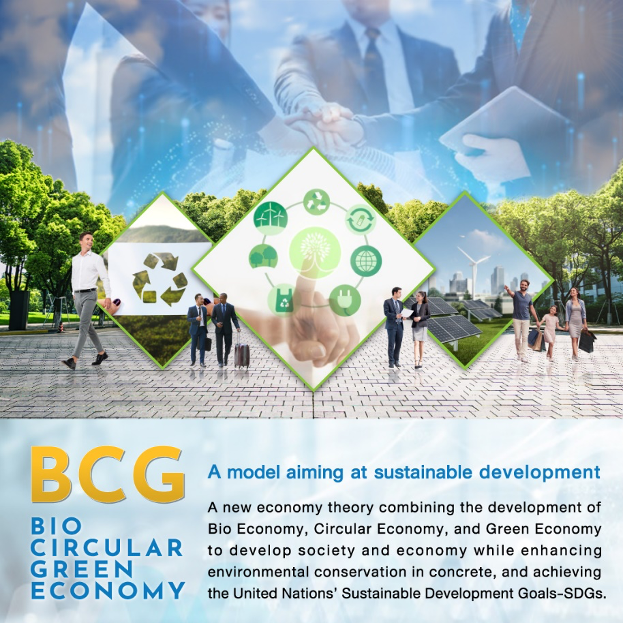January 2022
TICA
mice
UPDATE

What is BCG Economy Model? How is it related to MICE Industry?
Many people probably have heard about the “BCG Economy Model,” a national agenda approved by the cabinet which Thailand needs to adopt it to reach its goals of becoming a high-income country and aiming for sustainable development.
This article was originally found on Business Events Thailand.
BCG Economy Model is an economy model aiming at sustainable development. It is a new economy theory combining the development of 3 major sectors: Bio Economy, Circular Economy, and Green Economy to develop country’s society and economy while enhancing environmental conservation in concrete, and achieving the United Nations’Sustainable Development Goals-SDGs. This model is also in accord with the Sufficiency Economy Theory of the late King Rama IX.
Bio Economy is the use of knowledge, technology, and innovation to upgrade Thailand’s strengths in terms of biological resources and agricultural products to increase product values such as the development of rice varieties with greater nutrients, etc.
Circular Economy is the optimum utilization in benefit and value of existing resources focusing on Zero Waste principle such as transforming waste into several products to add value to trash, etc.
Green Economy is the development of economy, society, and the conservation of environment regarding natural resources preservation and restoration to enhance environmental sustainability such as the pollution and waste control, the green invention, and the green events, etc.
To follow the government key policy, TCEB employs the BCG Economy Model to MICE industry by raising the standards and enhancing sustainable MICE events. TCEB joins forces with 7 alliances: Designated Areas for Sustainable Tourism Administration (Public Organization) (DASTA), Tourism Authority of Thailand (TAT), Thailand Science Research and Innovation (TSRI), the Thai Chamber of Commerce and Board of Trade of Thailand, Thai Ecotourism and Adventure Travel Association (TEATA), Program Management Unit Competitiveness (PMUC), and Thailand Greenhouse Gas Management Organization (Public Organization) (TGO) to sign the Memorandum of Understanding (MOU) on Carbon Balance Scheme for enhancing the potential of event and tourism management with zero CO2 emission.
In addition, TCEB cooperates with TGO to apply technology to sustainable events by developing and improving the Carbon Footprint Calculator and advancing Carbon offset in events courses for MICE entrepreneurs and the education sector across the country while promoting creative MICE routes with low or zero carbon emissions for MICE travellers.
With the use of the Carbon Footprint Calculator, over 2,000 tons of carbon from hosting MICE events and activities in 2019 – present are decreased. As TCEB also implements Food Waste Prevention scheme, it helps MICE entrepreneurs reduce more than 300,000 kilograms of food waste which cost over 37 million baht, and lower more than 781 tons of carbon footprint. Apparently, TCEB always prioritizes environment and sustainable development.
Besides, in 2022, TCEB plans to reduce carbon footprint by 100,000 kilograms of Carbon Dioxide Equivalent (KgCO2e) through the MICE uplift to fight with Global Warming project to take the MICE industry to a new dimension with the accountability of society and environment while increasing competitiveness in market sustainably.
Continually hosting the sustainable MICE events with BCG Economy Model will undoubtedly improve society, economy, and environment in Thailand to handle the new era’s various changing trends of issues that the world society is interested in while promoting Thailand to the world as the potential country of being the destination for all types of sustainable MICE events.




